Abstract
The dropout phenomenon has become the current problem, increasingly severe, also present in universities. The troubling issue of university dropout, especially in the first year of studies has become a major concern for both the management of universities and for each faculty member. In order to increase the retention rate of students with a high risk of dropping out university firstly one must identify the causes, the factors which determine this process. In the context of these concerns, a study has been undergone within the University POLITEHNICA of Bucharest, during the second semester of the academic year 2016-2017. The results have shown that one of the important categories of factors which influences academic performances and leads to dropping out is the category of socio-emotional skills. These include integration into the new academic environment, communication with teachers and colleagues, the need for feedback and support in exam preparation etc. The proposed solutions should be designed based on the main factors contributing to student under-achievement and dropout from the earliest years of university. Among others, these solutions refer to methods and techniques of learning, limited exposure to new academic subjects at the university level, as well as the educational and career counseling activities dedicated to freshmen. In the same time, the papers’ approach focuses on the positive pedagogical idea that socio-emotional skills are learnable skills which are scientifically proven to be equally as important as cognitive skills in helping students build constructive and positive lives and avoid risky academic behaviors.
Keywords: Retention ratesocio-emotional skillsself-esteemfreshmenacademic performance
Introduction
In the specific context of a big institution of education as university it is, sociability is that particular feature aims to support students in adjustment of their attitudes, cognitive styles and behaviours to real life. This means a flexible and comprehensive integration of specific skills with adaptive significance for a person in order to correlate them to the external conditions of social environment. Moreover, building the students’ social intelligence is based essentially on assimilating the social experience. In this transformation process, students can’t ignore their own belifes, needs, aspirations and motivation. All of these are about dealing with various types of experiences and daily life situations, coping to emotions, feelings and manage them appropriately. In other words, students, as any other persons, need to have developed and trained socio-emotional skills in order to make effective the social integration and its formative influences. One of the most valuable socio-emotional skill is about establishing social interactions and relationships.
From this perspective, the school drop-out phenomenon becomes closely related to extend of which the social-emotional skills are developed to young people, among other factors and conditions that influence the Romanian students drop out in first year of faculty. The educational opportunities given by the system, the acces to education of different disadvantaged groups participating in education (Bălănescu, 2002) are only a few arguments based on wich we may validate the equity in the Romanian education system. An in-depth analysis should reveal other categories of factors related to the quality of education and the quality of students’ life.
Researches have shown the increasing role of socio-emotional skills of students in the adjustment process to the new situations in their social and academic lives. Regardless of their age, students have the need to belonging, self-esteem and safety to be satisfied, they need emotional maturity and trained communication skills in order to increase their chances tu complete the full stage of studies, according to the lycence or master cycle. On the contrary, emotional imaturity leads later to frustration and emotional conflicts (Peculea & Bocoș, 2016). As Piaget has stated, the accomodation and the assimilation are the key components of the psychological dimension which emphasizes the benefits of socio-emotional skills’ development, starting with the very early stages of life. This way, when students would integrate in a group, they are prepared to assimilate its most important characteristics the demands impposed on them by the group and the acceptance offers (Vincent, 2003). Overall, the social-emotional skills, once developed, affect health, welbeing, and future academic performances.
Nowadays, the challenges currently observed in tertiary education, referring to the above mentioned issues (The World Bank, 2014), emphasize the need of continuous development and practice of these two special domanins: the social and the emotional skills, in order for the students to learn development of establishing relationshps and social interactions, firstly, to their colleagues and teachers.
In this context, the need of support for students at risk of dropping out of public faculties in the first year of studies becomes obvious (Pricopie, Frunzaru, Corbu, Ivan, & Bargoanu, 2011; Voicu, Voicu & Nedelcu, 2008; The World Bank, 2014). However, in spite of emphasizing the influence of socio-emotional skills on drop out phenomenon, we have to admit that other several categories of factors have contributions to the students’ under-achievement and dropout from the first year of university. We reffer here to a complex image of analysing the school reality, which should take into consideration not only the underdevelopment of learning skills, but also the limited exposure to new academic and pedagogical contexts, mainly specific to universities, such as: class size, duration, interaction patterns with teachers, overworking through homework and projects etc. (The World Bank, 2014).
Problem Statement
It is a well-known fact that most first year students have just recently finished high school. The transition from high school to college is not an easy one, both emotionally and in terms of adapting to the requirements of another education system. Most of the times, students feel a negative transition from a system in which they have permanent guidance, both from teachers and parents, in which they have developed expectations and survival strategies in an educational process with which they were familiar with, to a new, confusing system at first, in which their autonomy of study and organization of school and social activities has increased greatly. This new learning environment in which they are trying to integrate is a challenge for them. Everything starts from simple things, such as deciphering the timetable, identifying the classrooms and the different structures that offer them dedicated services (counselling center, library, etc.) at the most complicated - adaptation to the new form of organizing didactic activity (courses, seminars, laboratories), adapting to the explicit and implicit rules of the school organization they are now in (expectations, representations on how to evaluate different teachers, prioritizing activities to get good school results). Thus, we found that students of the first year, pupils a few months ago, faced a series of dilemmas in the reconfiguration required by the new statute. An essential role in the success of this adaptation approach has its personal qualities and skills over time, such as: initiative capacity, organization and planning, adaptability, flexibility, and last but not least motivation.
In the second semester of the academic year of 2016-2017 a diagnosis study was carried out in order to identify factors and conditions which lead to poor academic performances and dropping out during the first year of studies for the students of University Politehnica of Bucharest (UPB). Knowing the profile of first year students is an essential condition in order to build an objective diagnosis on the factors that may support the risk of dropping out. From this perspective, the diagnosis study has followed on one hand identifying institutional factors regarding the contents of the study programs and teaching-learning processes, and on the other hand identifying personal factors, social-emotional factors which create the risk of dropping out. This second category will be analyzed in the present paper based on statistical interpretations and the conclusions that have emerged.
Thus, one of the conclusions of the study shows that socio-emotional factors have a major impact on learning. The new lifestyle is a challenge for many of the investigated students, considering they have not yet fully adapted to it.
Research Questions
It started from the hypothesis that social-emotional factors which affect first year students have a major impact on learning, including the amount of retention in the university. Thus, can a leopard change its spots? In other words, annually, there are some freshmen who are not able to build a relationship or to interact to others, who are a low level of confidence, respect or self-esteem. Is it too late for them to learn? Is it too late to change their patterns in order to learn how to cope with difficult emotional situations or how to deal to stress or conflicts? The study intent to make suggestions for possible solutions, trying to convince the both, students and teachers, that the development of socio-emotional skills is obviously necessary for the young adults, as students in first years of studies.
Purpose of the Study
The present paper shows the results obtained during the second part of the study which has the purpose to analyse the students’ opinion regarding factors that affect learning and influence students to drop out. In order to achieve this goal, the objective of the research has been identified, as follows: the analysis of social-emotional factors which determine students from the University Politehnica of Bucharest to put their education at risk or even drop out during the first year of studies.
Research Methods
The investigation had an observer-experimental character, the research being an empirical one, therefore the results obtained can not be generalized. During the research the quantitative research method has been used, specifically the investigation based on a questionnaire. In order to explore the opinions of first year students the questionnaire has been used as research tool, designed on three sections including mainly closed questiones. The questionnaire, calibrated on a 5 value Likert scale, was administered online, using the GOOGLE DRIVE application. The obtained results have been processed using the Excel program. Furthermore, in order to outline a more realistic picture of the situation, along with the questionnaire tool, document analysis has been used. Thus, for the student in the target group, admission results have been analysed and compared to the results from the first exam session. This analysis reveals a drop in the school performances for most students after the first exam session. One of the explanations may be that the transition itself from pre-university education to higher education, specifically adapting to different didactic requirements, to new demands and a different school organization.
Thus, it has been noticed that although 30% of students scored between 9 and 10 in their admission exams, after the first exam session this percentage only applies to half of the students. As a correlation, it has been noted that although during the admission exams only 3% of the inquired students scored between 5 and 7, after the first exam session their number raised to 25%, 64, 2 % of the responders do not benefit from any kind of scholarships after the first exam session. It is worthy to mention that 73, 1% of the questioned students have attended over 80% of didactic activities and only 7,5% have attended only 50%, so their opinion in relation with the analysed aspects is pertinent and can be taken into consideration.
At the study, 98 first year students from all 15 faculties of UPB have participated. From the perspective of gender distribution the structure of the target group included 50% female students and 50% male students. Regarding residence environments, responders originate mostly from urban areas. Taking into consideration the purpose and the objective of the study, the fact that it was achieved to answer questions and needs of UPB regarding the ulterior identification of solutions to increase the retention rate after the first year of higher education studies, the sample can be considered representative for the foundations of the conclusions of the study and to validate them as lessons to be learned for other universities interested in stimulating students to finish their license studies.
Findings
As previously stated, the data presented in the paper is part of a larger study that includes other categories for factors which influence the retention rate in the first year of university studies.
In the present research the students’ answers for the items regarding the impact of
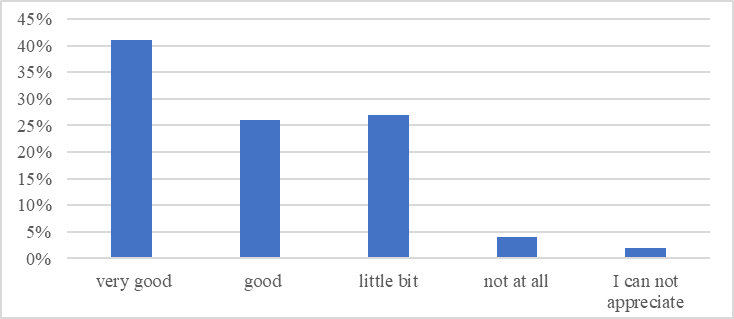
The next item is about the integration of first year students into groups in which they can practice different types of activities: educational, recreational, social or volunteering. According to the received answers it has been noticed that half of responders (53%) consider that they are integrated in at least one group that supports such activities, while a fairly large percentage (23%) believe they are not integrated in any group or that they are poorly integrated (figure
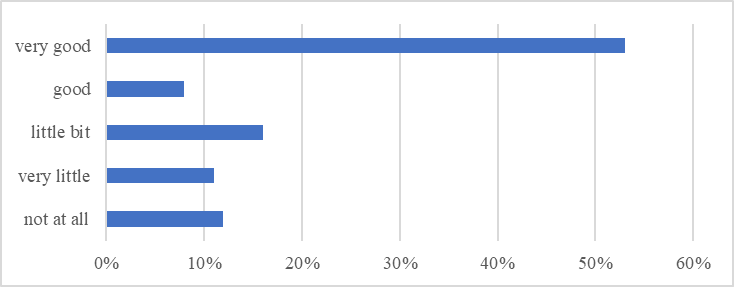
If we cumulate the percentages on categories (little, very little and not at all), the image becomes way more different, reaching an aproximate 40% responders who do not belong to any group, which makes the situation worrisome. These students fall under the risk of dropping out category. Integration into a group, regardless of its nature implies support from others, collaboration, feelings of acceptance and self worth. In the absence of these aspects, overcoming inherently difficult moments in the first year is much harder to do. The answers could not facilitate to analyze wether these students who admit their vulnerability in the area of group integration feel the others’ support in their own effort to integrate or do not have the interest and required abilities to do so.
Another aspect pursued in the research regarded the
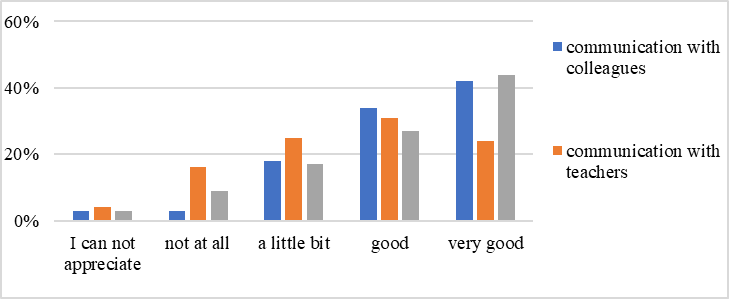
On the other hand, we perceive the design of the questionnaire as a limit to this research, the lack of differentiation of the expression of distinct opinions, concerning the colleagues, respectively the teachers. We can assume that the high percentage (71%) of the responses recorded in the regard of courage to express one’s personal views about peers, rather than teachers. These results often contradict the observed school reality, at least in the first year of studies, when students have a more conformist / obedient attitude towards teachers rather than investigative-argumentative ones. We can estimate that other causes that may lead to communication difficulties are related to students' emotions, especially in assessments and exams, or to the fact that teachers are not always available to communicate with them about their expectations or the assessment objectives / criteria, etc.
If we correlate the students’ answers for the last items analyzed above we obtain a more interesting picture. Although the majority claim they communicate well with their colleagues, 64% of responders state that are not currently integrated in any group where they can pursue school activities, recreational, social or volunteering activities. Despite the fact that they claim to have the courage to express their opinions towards their peers or teachers, over half (61%) of the responders face problems when communicating and relating to the teachers. These contradictory answers showcase the continuous need to develop and practice in new environments (school or social ones) two key competences: communicating and relating, for the purpose of building interpersonal relationships both horizontally and vertically.
In the first part of the study the difficulties for students to cover certain disciplines, to understand teaching and assessment, to manage their own resources and relationships, as well as the time reserved for studying during the first year have been identified. Based on these aspects, through the present paper we focused on support mechanisms and factors to help students overcome the afore mentioned difficulties.
From this perspective, the questionned students believe certain aspects would support them in completing the first year of studies such as: better communication relationships between student and teacher, more involvement from teachers in order to make contents more accessible and support the learning process and last but not least, offering more efficient feedback. Another factor identified by the students as being helpful when it comes to them finalising their studies is the existance of better studying conditions, lecture halls for every student dorm and adequate spaces designed for learning, individual study or teamworking, as well as socialising. Aspects regarding evaluation are not ignored either. The correctness of evaluation may affect the student emotionally. From the received answers it can be noticed that over half of the questionned students appreciate a correct, understandable evaluation as being objective – based on clear criteria – and transparent (65%). It is also important to mention that, besides further consultations and materials destined to prepare the student for the exams, students feel the need to have the teachers transmit them a positive feedback, in order to encourage and support them in overcoming difficulties, both during the academic year but also in the exam session.
Thus, positive feedback represents one of the social-emotional factors identified in this study, which might have a positive impact in helping students decide against dropping out after the first year. To sum it up, students desire feedback and specifically positive feedback, both regarding activities during the semester and also after the exams. Unfortunately, a large number (65%) believe they did not receive such encouraging feedback from the teachers which leads to a drop in motivation to study (figure
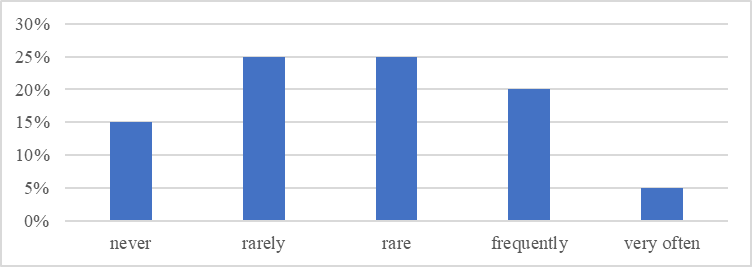
A difficulty students meet is the one reffering to managing the time allocated to studying. As such, after the first exam session, 57% of responders believe they have met difficulties in organising their own resources and time for studying. 60% of responders claim they have been helped by roomates/dorm mates while preparing for the exams, which confirm the fact that students study way easier togather, collaborating both face to face and online (figure
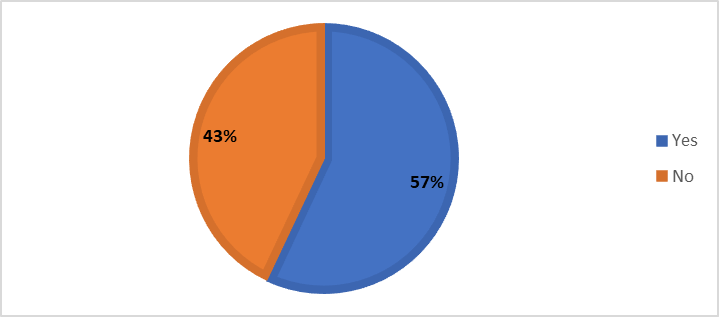
In conclusion, after the first exam session, the questionned students believe it is more difficult to manage aspects regarding covering certain disciplines (63%), understanding the teaching method and evaluation (57%), communicating with teachers (46%), effectively using their own resources and time allocated to studying (57%), the existance of learning environments which facilitate collaborative learning. Last but not least, it should be noticed that this chapter of difficulties in overcoming inherent obstacles the lack of motivation, inner resources in order to continue their studies have been mentioned.
If the first two mentioned aspects – regarding the understanding of the contents of disciplines and the teaching-evaluating process – can be analyzed from the perspective of students’ cognitive development, the rest of the observed situations involve the social-emotional development of students, which also affects their school performances. As a result, developing and practicing socio-emotional abilities should pose as a central objective concerning the informal activities with students in the university, involving experts and structures which can in turn contribute in this matter: psichopedagogical departments, counselling centres, volunteering centres, student organisations, etc.
Conclusion
Henry Wadsworth Longfellow said “we judge ourselves by what we feel capable of doing, while others judge us by what we have already done”. In order to know what he/she is able to do, a student need firstly to start a process of self-awareness in terms of personal qualities, professional interests and aspirations. The teachers, in turn, should support their efforts, not only from the academic performances’ perspective, but also offering them guidance, models and advices to cope with various situations from daily life. They shouldn’t only judge what the students have already done, but also support them to understand the situations and develop appropriate skills to manage emotions, stress, time management, blockages in communication and relationships etc. Here is a range of possible solutions to the issues mentioned above, focused on at least two directions, as follows:
actions need to be taken in order for students to develop learning tehniques which help them be more organised and study better. We take into consideration team working, learning from the older/more experienced students/PhD candidates, as well as methods and strategies which support individual learning, according to modern learning theories, as a basis for self education and permanent education.
another possible solution is represented by educational and career counselling activities, dedicated to freshmen, aiming to support them in exploring their professional aspirations and interests, but also in discovering themselves in terms of personal qualities.
These activities could be included in a specific area of personal development training, integrating activities for socio-emotional skills development in order for the students to learn how to build relationships in communication, in social interactions, in decision making process etc.
No matters the solution is chosen. Year by year, some of our students will be underdeveloped in relation to their level of maturity, life wisdom and awareness. It is our permanent challenge and duty to work with them, to teach them, not only about different subject, but also about life, emotions, communications and relationships. And to hope that our work will help them to navigate through these turbulent times and get well into the peacefull lands inside of them.
References
- Balanescu, L. (2002). Access to education for children in extreme poverty. Institute for Quality of Life. Retrieved from http://www.iccv.ro/sites/default/files/accesul-la-educatie-al-copiilor-aflati-in-saracie-extrema.pdf
- Peculea, L., & Bocoș, M. (2016). Formative approaches for socio-emotional development of pre-schoolers, Journal of Educational Sciences&Psychology, vol. VI (LXVIII), (1B), 210-217.
- Pricopie, R., Frunzaru, V., Corbu, N., Ivan, L., & Bârgăoanu, A. (2011). Access and equity in higher education in Romania. Bucharest: Comunication.ro, ISBN 978-973-711-299-6. (Report POSDRU nr. 41506). Retrieved from http://www.invatamant-superior.ro/wp- content/uploads/2013/08/Acces_si_echitate.pdf
- The World Bank. (2014). Country Partnership Strategy (CPS) for Romania for the period 2014-2017. (Report No 84830-RO). Retrieved from http://documents.worldbank.org/curated/en/801961468095641262/pdf/848300REVISED0020Box385199B00OUO090.pdf
- Vincent, R. (2003). Knowledge of the child. Bucharest: Didactical and Pedagogical Publishing House.
- Voicu, B., Voicu, O., & Nedelcu, A. (2008). The rate of transition from one educational cycle to another and the graduation rate of an educational cycle. Perspectives at school level. (Report for Ministry of Education and Research/Project Management Unit/Rural Eduation Project). Retrieved from https://www.academia.edu/12136219/Rata_de_trecere_de_la_un_ciclu_educa%C5%A3ional_la_altul_%C5%9Fi_rata_de_absolvire_a_unui_ciclu_educa%C5%A3ional._Perspective_la_nivelul_%C5%9Fcolii_Raport_c%C4%83tre_Unitatea_de_Management_al_Proiectelor_pentru_%C3%8Env%C4%83%C5%A3%C4%83m%C3%A2ntul_Preuniversitar_Coordonator_Componenta_3_Bucure%C5%9Fti_CEDU_2000_
Copyright information

This work is licensed under a Creative Commons Attribution-NonCommercial-NoDerivatives 4.0 International License.
About this article
Publication Date
15 August 2019
Article Doi
eBook ISBN
978-1-80296-066-2
Publisher
Future Academy
Volume
67
Print ISBN (optional)
-
Edition Number
1st Edition
Pages
1-2235
Subjects
Educational strategies,teacher education, educational policy, organization of education, management of education, teacher training
Cite this article as:
Oproiu*, G. C., & Lițoiu, N. (2019). Improving Retention Rate In University Through Developing Socio-Emotional Skills. In E. Soare, & C. Langa (Eds.), Education Facing Contemporary World Issues, vol 67. European Proceedings of Social and Behavioural Sciences (pp. 596-604). Future Academy. https://doi.org/10.15405/epsbs.2019.08.03.71
